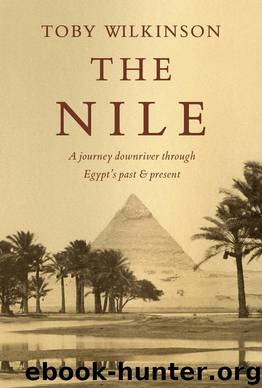The Nile by Toby Wilkinson

Author:Toby Wilkinson
Language: eng
Format: mobi, epub
ISBN: 9780385351560
Publisher: Knopf Doubleday Publishing Group
Published: 2014-06-09T18:30:00+00:00
The Kuftis proved to be the most troublesome people that I have ever worked with.1
—FLINDERS PETRIE
North of Luxor, as the Nile enters the great, eastward bend in its course, the landscape of age-eroded limestone bluffs and lush green fields is reflected in the river’s gently flowing waters. Yet, by comparison with Thebes, there is a noticeable difference in the state of the banks, canals and verges: they are strikingly free from rubbish, cleaner here than anywhere else in the country. It is a small distinction, but an important one, for it reflects the independent character of the people in this part of Egypt.
The story of refuse collection is in many ways a parable of life in the contemporary Nile Valley. In the old days, people will tell you, rubbish used to be collected by private contractors, or rather by their armies of small boys who collected the refuse sacks from the roadsides at four o’clock in the morning, just before dawn. At the collecting depot, the organic waste was separated off and sold as fertiliser, earning the contractors a tidy profit. It was a successful system that suited everyone. Everyone, that is, except the authorities, who were jealous of any lucrative sector they did not control themselves. So, the contracts for rubbish collection were taken away from the private operators and given to big companies in exchange for large bribes. Service suffered, the streets and canals started to become choked with rubbish, but there was little that ordinary citizens could do: it was all part of the corruption and sclerosis of Mubarak’s Egypt.
But, in the rural south of the country, the doughty locals—always independent-minded and sceptical of their distant rulers—took matters into their own hands. In the towns and villages between Luxor and Qena, the inhabitants organise rubbish collection, sorting and disposal themselves. As a result, their surroundings are cleaner and greener. It is a metaphor for the divide in Egyptian society, not just between north and south (northern Egyptians think southerners backward; southerners find their northern compatriots rude and selfish) but between the centre and the provinces. The tension between central control and provincial self-assertion is a leitmotif in Egyptian history; nowhere is it more apparent than in this part of Upper Egypt.
Download
This site does not store any files on its server. We only index and link to content provided by other sites. Please contact the content providers to delete copyright contents if any and email us, we'll remove relevant links or contents immediately.
| Africa | Americas |
| Arctic & Antarctica | Asia |
| Australia & Oceania | Europe |
| Middle East | Russia |
| United States | World |
| Ancient Civilizations | Military |
| Historical Study & Educational Resources |
The Daily Stoic by Holiday Ryan & Hanselman Stephen(3321)
The Fate of Rome: Climate, Disease, and the End of an Empire (The Princeton History of the Ancient World) by Kyle Harper(3067)
People of the Earth: An Introduction to World Prehistory by Dr. Brian Fagan & Nadia Durrani(2736)
Ancient Worlds by Michael Scott(2688)
Babylon's Ark by Lawrence Anthony(2679)
The Daily Stoic by Ryan Holiday & Stephen Hanselman(2575)
Foreign Devils on the Silk Road: The Search for the Lost Treasures of Central Asia by Peter Hopkirk(2464)
India's Ancient Past by R.S. Sharma(2454)
MOSES THE EGYPTIAN by Jan Assmann(2417)
The Complete Dead Sea Scrolls in English (7th Edition) (Penguin Classics) by Geza Vermes(2283)
The Earth Chronicles Handbook by Zecharia Sitchin(2229)
Lost Technologies of Ancient Egypt by Christopher Dunn(2226)
24 Hours in Ancient Rome by Philip Matyszak(2084)
Alexander the Great by Philip Freeman(2065)
Aztec by Gary Jennings(2029)
The Nine Waves of Creation by Carl Johan Calleman(1917)
Curse Tablets and Binding Spells from the Ancient World by Gager John G.;(1861)
Before Atlantis by Frank Joseph(1854)
Earthmare: The Lost Book of Wars by Cergat(1825)
